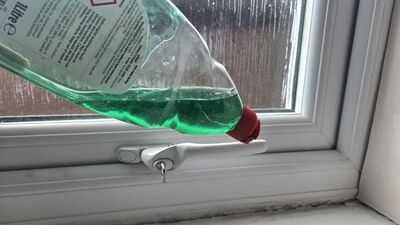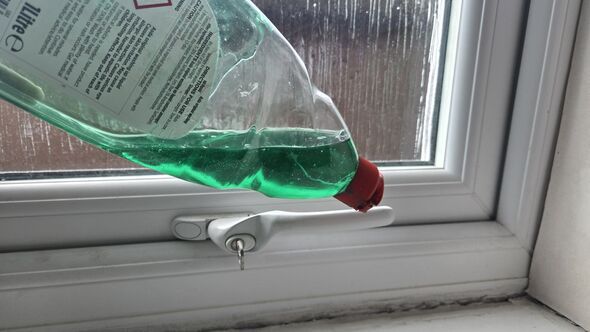

Households across the UK are being urged to rub washing up liquid on windows from October to help prevent condensation. The autumn season has now arrived and temperatures will slowly start to drop from October onwards as we head towards winter - which can mean you'll start to notice condensation forming on your windows, particularly in the morning.
Condensation is a common problem at this time of the year and occurs when warm air inside your home meets the cold surface of the glass, which then forms water droplets on the glass as it cools. The sitting water is not only unsightly but if left unchecked it can lead to more serious problems like black mould and mildew which can be damaging to your health. But according to experts, there is an easy way to tackle the problem of condensation over autumn and winter and all you need is a bit of washing up liquid.
Experts say rubbing a thin layer of washing up liquid on a dry window can help to prevent condensation from forming as it contains surfactants which reduce the surface tension of the water, causing it to spread out into an invisible layer rather than forming droplets.
Experts at Home Things explain: "By taking a small drop of washing up liquid and rubbing it into the condensation-prone window with a dry cloth you can completely stop the issue all together.
"The washing up liquid forms a barrier on the surface of the windows, preventing the water from sticking. So in the space of just a few minutes, you can put a stop to the damp, mould, and mildew that wet windows can cause."
You can pick up a bottle of washing up liquid at Tesco for just 63p so it's a really cheap and easy way to tackle this common seasonal problem, but you will need to reapply it regularly as it's not a permanent fix.
Experts at Glazing Refurbishment said: "Applying dish soap to windows can provide a temporary solution by creating a film that prevents water droplets from forming; however, it's not a permanent fix.
"Over time, the soap film will wear away, and the condensation may return. For a long-term solution, you need to manage the humidity levels in your building and improve insulation."
Your heating can play a big part in how much condensation forms in your home as the warmer the air is, the more moisture it will hold. So if you heat one room to a higher temperature and leave other rooms cold, condensation can be worse in the unheated rooms.
To avoid this, the World Health Organisation guidelines suggest a minimum temperature of 21C in a living room and 18C in bedrooms, and it's recommended that heating is left on low all day in cold weather to help control condensation.
If you do get a build up of condensation on your windows, make sure to wipe surfaces down to prevent mould forming and spreading and if you notice any black spots, give your window a clean with a mild bleach solution or anti fungal spray.
-
Zero will get relief from the hairstyle, the ‘this’ substance in the kitchen will make lifeless hair alive; Learn the correct method of using

-
Check How Ai Tool Guided Her to Luck

-
BSNL Rechare Plan: Frequent recharging concerns erased! BSNL came with 11 months of cheap plans, high-speed these benefits

-
AI more threatens to women’s job than men, claim in United Nations report

-
Ashwin’s new avatar: After IPL, now BBL and LT20 will rock! , Read
